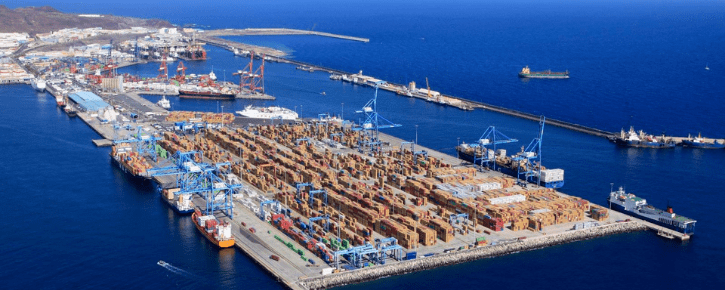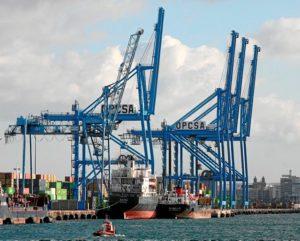
The container terminal OPCSA future-proofs its operation with new rugged computers
“The service and speed we get with JLT has surprised us. They can deliver faster than local suppliers and go the extra mile to make sure we get the best value for our investment,” Pablo Rodríguez Domínguez, IT, OPCSA.
OPCSA or Operaciones Portuarias Canarias SA has been operating since 1986 and is the largest, most modern container terminal in the Canary Islands. The terminal is based in the port of Las Palmas in the north-east of Gran Canaria, Spain. OPCSA is directly connected with more than 74 ports around the world and lies on the busy shipping routes between Europe, Africa and South America.
Future proofing their business
Pablo Rodríguez Domínguez has been an IT Specialist at OPCSA for over two years and worked on the project to update the IT system. Led by IT Manager, Orlando Valerón Rodríguez, it was a true team effort. Pablo explains why the port decided to upgrade, “We were running an old Terminal Operating System (TOS) that didn’t offer the functionality required by modern ports. Things like 4G and GPS. As our computers would not support our new software we needed to update these too.”
OPCSA’s current computers had other disadvantages too. Namely they only supported one type of connection, so there were limitations over what peripherals they could connect to the hardware.
“Rather than just update to a solution that would work in today’s world, we wanted to invest in software and hardware that would serve us years into the future,” comments Pablo.
The port knew they wanted to change their TOS to NAVIS N4 and needed to find rugged computers that could integrate with the software seamlessly. Pablo expands on what they looked for, “integration with NAVIS was the most important criteria, but we also wanted reliable and fit for purpose devices that would work well in the demanding conditions of a port”.
Testing – JLT on top
Before committing to a purchase, the team at OPCSA thoroughly tested the different manufacturers. They looked at how the devices would meet their needs in terms of the functionality as well as more basic things like compatibility with mount systems and power supply.
During the testing phase OPCSA discovered that many of the shortlisted Vehicle-Mounted Terminals (VMTs) would not function properly with OPSCA’s own set up. “We found that some of the models we tested didn’t fulfill our basic requirements. In comparison, JLT’s rugged computers worked and offered other advantages such as a borderless screen and good visibility across different light conditions compared to other devices,” says Pablo.
Due to his experience of working with other VMT manufacturers, Orlando Valerón Rodríguez, IT Manager of the port quickly saw the opportunity that JLTs products presented as a solution for future needs.
”We wanted to invest in software and hardware that would serve us years into the future”
Operation without interruptions
In the end, the port contracted JLT’s close partner and IT systems integrator, Autepra, to ensure a hassle-free integration.
In total, OPCSA ordered over 100 Navis ready JLT rugged VMTs for use in all container handing equipment including ship-to-shore cranes, rubber tire gantry cranes, retrieval systems and prime movers.
When Pablo and his team drew up a shortlist of potential manufacturers, they included local suppliers because they thought geographical proximity would lead to speedier logistics and support, a key factor when running a busy port. However, once the order was placed, things moved much faster than expected, despite the distance between Gran Canaria and Sweden. Including shipping, the testing unit with the locked down image took just ten days to turn around.
Installation took just five days, thanks to the cooperation between AUTEPRA and OPCSA technicians. JLT shipped the units with pre-mounted cables and connectors, so it was a simple case of plug and play, and OPCSA could continue operating throughout the process.
“The speed at which JLT operates really surprised us. Despite being on the other side of Europe they respond quickly and are always ready to help,“ comments Pablo.

OPSCA have JLT rugged VMTs installed in ship-toshore cranes, rubber tire gantry cranes, retrieval systems and prime movers
A motivated workforce
Alongside having an IT system that is ready to meet the challenges of running a busy port, OPCSA received great feedback from its workforce on the new rugged computers. Vehicle operators really appreciate the reliability of the computer and its high-performance screens.
Now OPCSA is ready to meet the challenges and changes that the next ten years present.
Pablo has some advice for others in the same position, “when you’re updating any of your IT in a port environment, it’s important to think about what issues you’ve had in the past and your ambitions for the future. And don’t forget the importance of support and service in the here and now. Make sure to choose a partner that you can trust and rely on.”
If you have questions or like to know more about our products and services, do not hesitate to contact us.
Want to learn more?
We’re here to help and advise you on every aspect of rugged devices and industry data communications.
Please fill in the form and we will get back to you as soon as possible.
